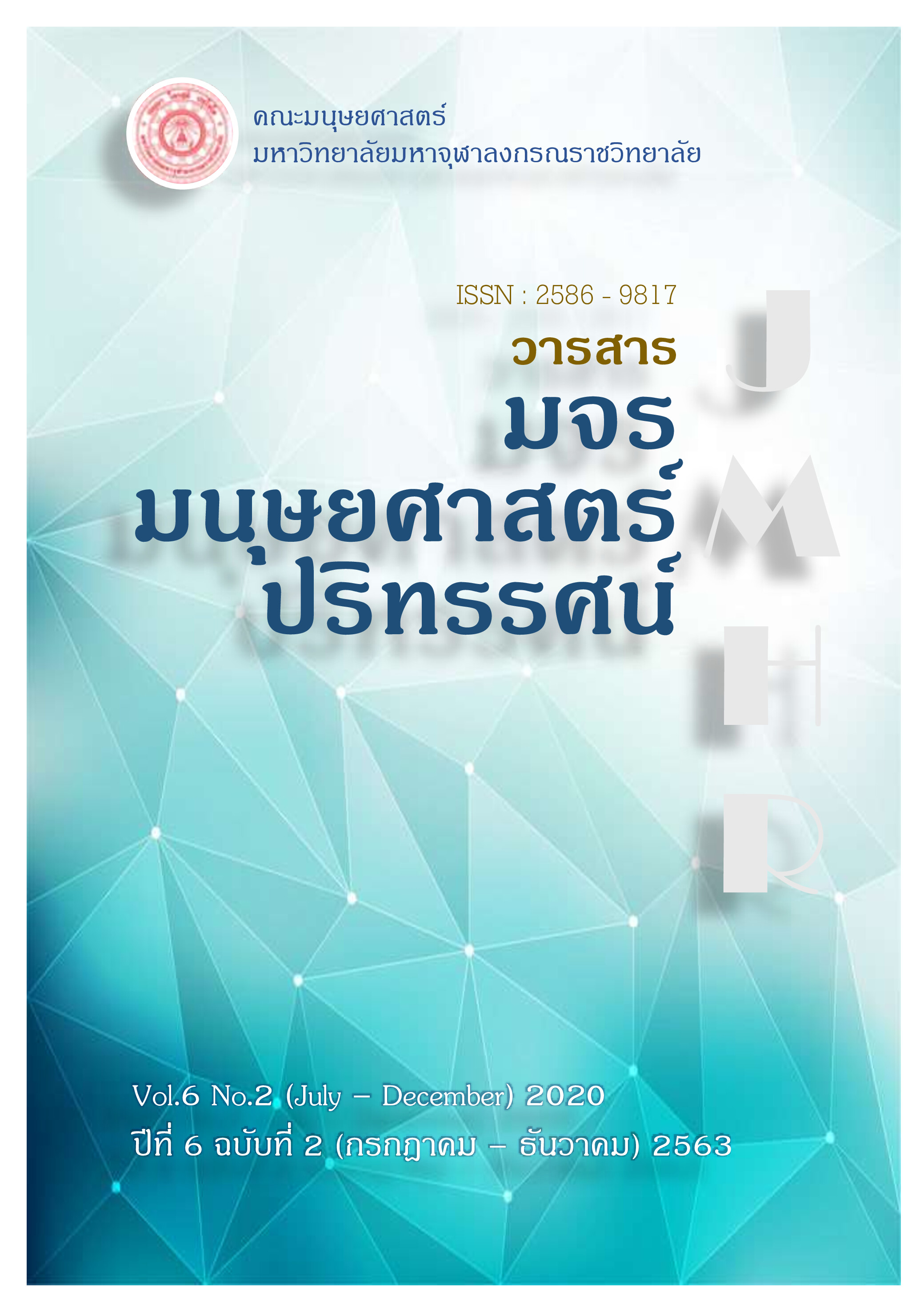การศึกษาเบื้องต้น : ประสบการณ์การสูญเสียบุคคลอันเป็นที่รักของผู้ที่ฝึกเจริญวิปัสสนา
คำสำคัญ:
การวิจัยเชิงคุณภาพ, การสูญเสียบุคคลอันเป็นที่รัก, ผู้ฝึกเจริญวิปัสสนาบทคัดย่อ
การสูญเสียบุคคลอันเป็นที่รักเป็นประสบการณ์ที่บุคคลต้องเผชิญในช่วงใดช่วงหนึ่งของชีวิต ซึ่งนับเป็นการเปลี่ยนแปลงครั้งสำคัญในชีวิตของคนเรา การจากไปอย่างไม่มีวันกลับของผู้เป็นที่รักส่งผลกระทบมากมายต่อผู้สูญเสีย ทั้งทางร่างกายและจิตใจ โดยเฉพาะความรู้สึกโศกเศร้ากับการจากไปเป็นผลกระทบทางจิตใจหลักๆ ที่เกิดขึ้นกับผู้สูญเสียทุกคน การผ่านช่วงเวลาแห่งความโศกเศร้าจากการสูญเสียนี้ก็ไม่ใช่เรื่องง่าย การวิจัยครั้งนี้เป็นการวิจัยเชิงคุณภาพแนวปรากฏการณ์วิทยา วัตถุประสงค์เพื่อศึกษาประสบการณ์การสูญเสียบุคคลอันเป็นที่รักเบื้องต้นในผู้ที่ฝึกเจริญวิปัสสนา ผู้ให้ข้อมูลหลัก คือผู้ที่สูญเสียบุคคลอันเป็นที่รัก เช่น บิดามารดา สามีภรรยา จำนวน 3 คน เก็บข้อมูลด้วยการสัมภาษณ์เชิงลึกใช้คำถามสัมภาษณ์แบบกึ่งโครงสร้าง ผลการศึกษาพบประสบการณ์การสูญเสียบุคคลอันเป็นที่รักของผู้ที่ฝึกเจริญวิปัสสนา 3 ประเด็นหลักได้แก่ ประเด็นหลักที่ 1 แสดงถึงความผูกพันกับผู้ที่เป็นที่รัก ประเด็นหลักที่ 2 ครอบคลุมประสบการณ์ในช่วงเวลาของการสูญเสีย ประกอบไปด้วย 3 ประเด็นย่อย ได้แก่ ไม่คาดคิด กังวลใจ มุ่งมั่นทุ่มเทดูแลด้วยความหวังและความรัก ความรู้สึกหลากหลายท่วมท้นยากจะบรรยายเมื่อผู้เป็นที่รักจากไป และรู้สึกว่างเปล่า หวนระลึกถึงความทรงจำที่มีร่วมกัน โศกเศร้าอาลัยจนกระทบการใช้ชีวิต ประเด็นหลักที่ 3 การยอมรับ การนำหลักธรรมมาปรับใช้ และการเห็นคุณค่าการสูญเสีย ประกอบด้วย 4 ประเด็นย่อย ได้แก่ รู้ซึ้งถึงทุกข์จากการสูญเสีย ยอมรับความสูญเสียผ่านการเชื่อมโยงความทุกข์เข้ากับหลักธรรม เห็นคุณค่าของการสูญเสียและการมีชีวิต และใช้ชีวิตเพื่อเป็นประโยชน์ต่อผู้อื่น ซึ่งความรู้ความเข้าใจดังกล่าวสามารถนำมาเป็นฐานในการเข้าใจประสบการณ์ของผู้รับบริการที่มีความโศกเศร้าจากการสูญเสียบุคคลที่รัก รวมถึงสามารถนำไปต่อยอดการศึกษาการบำบัดทางจิตวิทยาที่อาศัยการเจริญวิปัสสนาเป็นฐานในการเยียวยาจิตใจผู้สูญเสียบุคคลอันเป็นที่รักต่อไป
เอกสารอ้างอิง
นิมัศตูรา แว, เปรมฤดี ดำรักษ์, ผุสนีย์ แก้วมณีย์, กฤตพัทธ์ ฝึกฝน และขวัญตา บุญวาศ. (2559). ประสบการณ์การเยียวยาตนเองของสตรีที่สูญเสียสามีจากเหตุการณ์ความไม่สงบ: กรณีศึกษา อำเภอเมือง จังหวัดยะลา. วารสารเครือข่ายวิทยาลัยพยาบาลและการสาธารณสุขภาคใต้, 3(3), 1-14.
เนตรฤทัย ภูนากลม, วิสัย คะตา, และสุนทร โพธิสาร. (2559). ความคิด ความรู้สึกของบิดามารดาชาวไทยอีสานและชาวลาวต่อการสูญเสียบุตรจากการเจ็บป่วยขณะเข้ารับการรักษาที่โรงพยาบาลนครพนม. วารสารพยาบาลกระทรวงสาธารณะสุข. 26(1), 79-92.
พระไตรปิฎกฉบับหลวง. (2547). พระไตรปิฎกเล่มที่ 22 พระสุตตันตปิฎกเล่มที่ 14 อังคุตตรนิกาย ปัญจก-ฉักกนิบาต. สืบค้น 8 สิงหาคม 2563, จาก https://84000.org/tipitaka/read/?22/48-59
พระปณต คุณวฑฺโฒ (อิสรสกุล) และสาระ มุขดี. (2554). ผลของการเยียวยาความโศกเศร้าของผู้สูญเสียบุคคลอันเป็นที่รักด้วยกิจกรรมทางพุทธศาสนา และการปรึกษาเชิงพุทธจิตวิทยา. วารสารสมาคมจิตแพทย์แห่งประเทศไทย, 56(4), 403-412.
รัชนู วรรณา. (2557). ความชุกของอารมณ์เศร้าโศกที่ผิดปกติจากการสูญเสียและปัจจัยที่เกี่ยวข้องที่พบในผู้ป่วยนอกจิตเวชโรงพยาบาลจุฬาลงกรณ์ (วิทยานิพนธ์ปริญญาวิทยาศาสตรมหาบัณฑิต). จุฬาลงกรณ์มหาวิทยาลัย. กรุงเทพฯ.
สมเด็จพระพุทธโฆษาจารย์ (ป. อ. ปยุตฺโต). (2562). พุทธธรรม ฉบับปรับขยาย. สืบค้น 8 สิงหาคม 2563, จาก https://www.watnyanaves.net/th/book_detail/583
สิริวรรณ นิรมาล, วราภรณ์ คงสุวรรณ, และกิตติกร นิลมานัต. (2557). ประสบการณ์ภาวะโศกเศร้าของภรรยาที่สามีเสียชีวิตจากการเจ็บป่วยวิกฤต: การปฏิบัติตามวิถีพุทธเพื่อการเยียวยา. วารสารคณะพยาบาลศาสตร์ มหาวิทยาลัยบูรพา, 22(4), 47-57.
ศรินรัตน์ วัฒนธรนันท์. (2560). ความโศกเศร้าจากการสูญเสียบุคคลอันเป็นที่รัก: บทบาทพยาบาล. วารสารพยาบาลสภากาชาดไทย, 10(1), 13-21.
อรสา ใยยอง. (2553). ภาวะซึมเศร้าและอารมณ์โศกเศร้าจากการสูญเสียของผู้สูงอายุ ในชมรมผู้สูงอายุ จังหวัดนนทบุรี (วิทยานิพนธ์ปริญญาวิทยาศาสตรมหาบัณฑิต). จุฬาลงกรณ์มหาวิทยาลัย. กรุงเทพฯ.
Baier, M., & Buechsel, R. (2012). A model to help bereaved individuals understand the grief process. Mental health practice, 16(1).
Borneman, T., Stahl, C., Ferrell, B. R., & Smith, D. (2002). The concept of hope in family caregivers of cancer patients at home. Journal of Hospice & Palliative Nursing, 4(1), 21-33.
Giorgi, A., Giorgi, B., & Morley, J. (2017). The Descriptive Phenomenological Psychological Method. In Willig & Rogers (Eds.), The Sage Handbook of Qualitative Research in Psychology (2nd ed., pp. 176-192). Sage.
Kubler-Ross E. (1969). On death and dying. NY: MacMillian Publishing.
Latham, A. E., & Prigerson, H. G. (2004). Suicidality and bereavement: complicated grief as psychiatric disorder presenting greatest risk for suicidality. Suicide and Life-Threatening Behavior, 34(4), 350-362.
Neimeyer, R. A., & Young-Eisendrath, P. (2015). Assessing a Buddhist treatment for bereavement and loss: The Mustard seed project. Death Studies, 39(5), 263-273.
Parkes, C. M. (1998). Coping with loss: Bereavement in adult life. Bmj, 316(7134), 856-859.
Zisook, S., & Shear, K. (2009). Grief and bereavement: what psychiatrists need to know. World Psychiatry, 8(2), 67-74.






